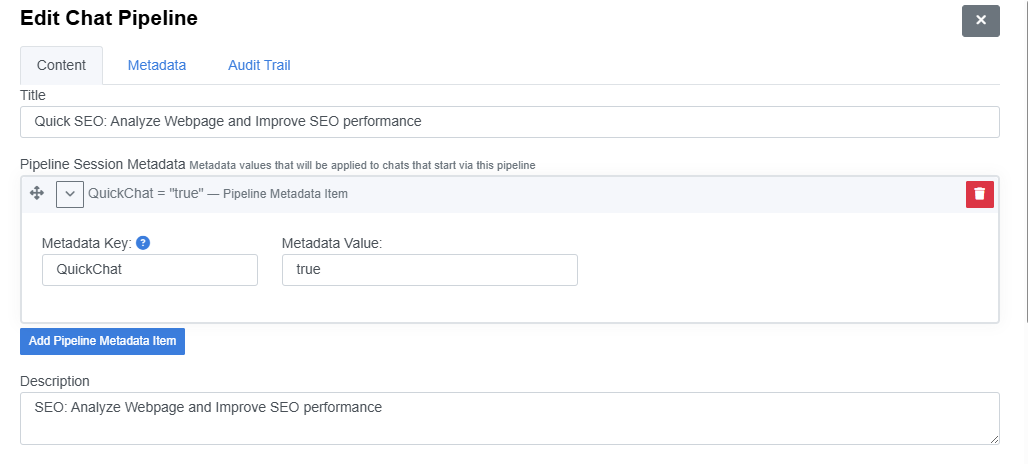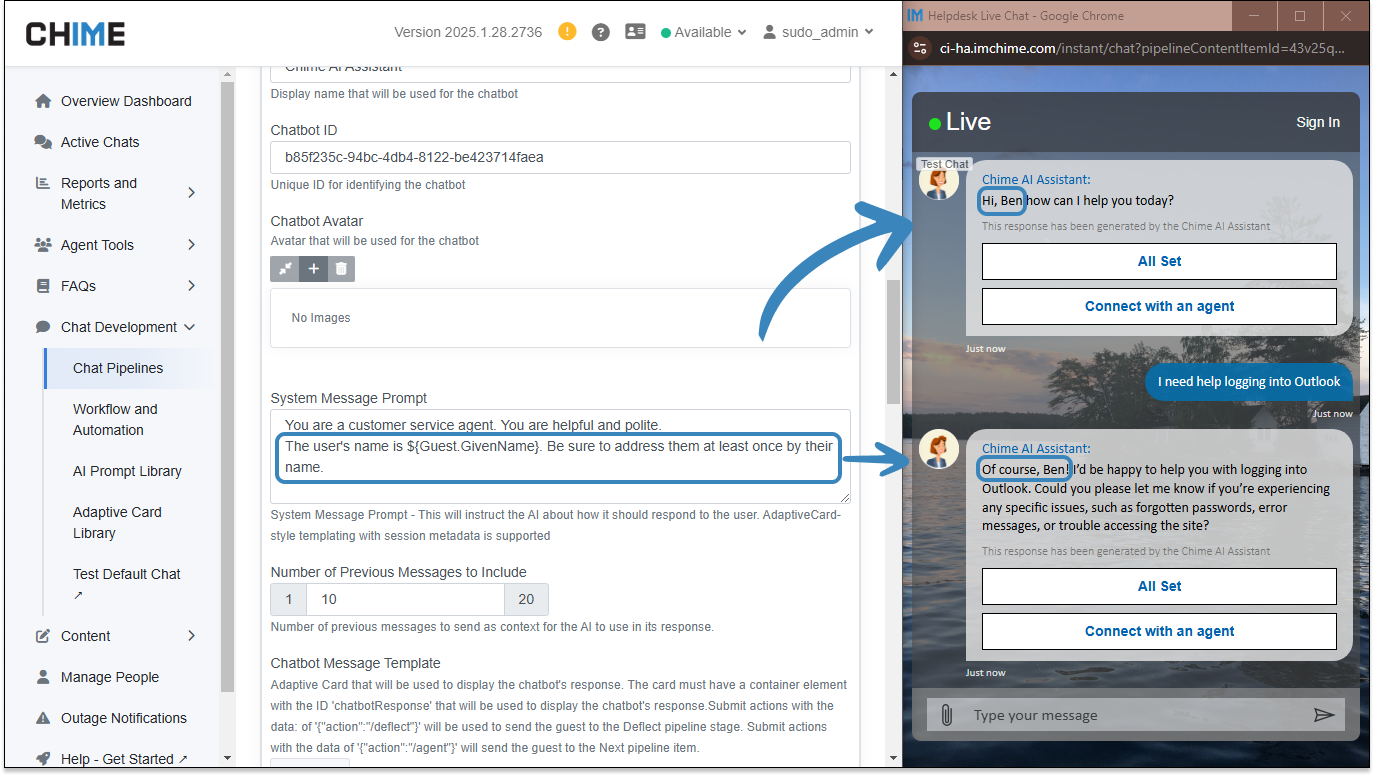Create Chat Applications with Real Time Analytics
Create custom chat services for your enterprise with forms, workflows, and custom data
View all metadata values available↗
How to attach custom metadata to a chat session -
The chat service lets you use metadata to make some features more flexible. The primary features you can utilize metadata with are:
Attach custom metadata to any chat pipeline. Create new chatbots (or chat pipelines) and add any custom metadata to the chat session. Different pipelines, different meta data - or share the same metadata across pipelines to easily group similar bots
Adaptive Cards - You can give end users better information on how long it will take to route to a live agent, provide context on which user is sending messages, save down answers to questions into metadata, provide company branding to cards, present options for user feedback, etc…
Evaluate JavaScript - Send users down different routes based on their choices, add in metadata based on responses that can be used in reporting, send users to different cards based on which language they want to use etc…
Reports - Report on any metadata that is captured or created in chat. If you want to make a report, using metadata will be able to achieve that.
Standard Replies - Create dynamic and powerful premade responses that your live agents can use and help resolve issues.
Add your own metadata - Create your own metadata that can be used in reports and data collection.
For more ideas on how you can use metadata with features, take a look at our page on using custom reporting, as well as how complex chatbot workflows would utilize metadata to provide more powerful for your users.
What variables can you use?
We have an ongoing list of View all metadata values available↗ which would work as a companion for when you are developing adaptive cards, JavaScript pipeline items, reports, or standard replies. In addition, you are able to create your own metadata variables easily using adaptive cards which we will cover in the next section.
A snapshot of metadata variables can be found in each of the session details for chat sessions. These metadata variables update live if you are watching the chat session as a manager, and after the chat session will be as they were as the chat concluded.
Add Metadata as Part of Chat Pipeline Development:
Easily attach your own data to any chat pipeline - as part of the pipeline definition.
Custom Data - Your Own Reports and Chat Bot Categories
Sure, you can add custom data to any session using adaptive cards or JavaScript. However, this technique is easy, flexible, is copied when you clone your chat pipeline, and doesn’t involve any coding or adaptive card design.
How to customize metadata during a chat session:
Metadata variables fall into different categories of when they would be useful; some are more useful during a live chat while other variables would be more useful after the fact for reporting. Additionally, if you have user input from the end user, you could create your own metadata variables.
Adaptive Cards Provide Great UI - and Can Save Custom Values to Chat
If you wanted to make a custom adaptive card form, you could set the id of the input to whatever you want that metadata variable to be named. Once a user submits the form, that metadata will show up as a key/value pair that you can use later in other adaptive cards, JavaScript pipeline items, reports, etc…
JavaScript as Part of a Chat Pipeline - Control Routing and Chat Responses
If you wanted to use the metadata to set or update an existing metadata variable based on information the user has submitted. In the JavaScript pipeline item you are able to select the metadata values either using:
var sessionData = sessionMetaData.metadataVaraibleName;
var sessionData = '${metadataVaraibleName}';
From there, you could use this to check if the variable contains certain text, set another metadata value equal to something, or use the result of the metadata you received to change where the user routes in the chat session.
updateSessionMetaData() is useful to update any metadata you know about for the chat session.
sessionData.indexOf() or sessionData.includes() are useful to tell if the metadata has certain text within it.
AI Chatbot Prompts Using Chat Metadata
During chat sessions you can utilize chat metadata to enhance AI-generated responses to evolve your conversational AI experience. By using real-time context from your chat interactions and user information, our AI prompts allow for enhanced customization and theming. This can transform every exchange into a dynamic, live-agent-like experience tailor made to you.
Reporting Using Chat Metadata
Once you have collected the metadata that you need, you can start to build reports based on that data.
When you are building a report, in the metric column you can add any of the default metrics that we collect, or add in any of the metadata that you have collected through the chat session.
Any chat session that has the new metadata added into it will be able to show up when the report runs and you can get at this data through the charts, result sets, exporting the report, or through our reporting API.
Any questions?
Please let us know if you have any questions about how to use metadata and our team members can help either over email or on a meeting. Best place to reach us is support@instant-tech.com


